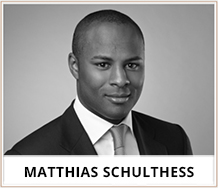|

C-Level Positions are gaining in importance as family offices are becoming more professional and are looking for the right people to be so, according to Matthias Schulthess. Schulthess is a Zurich-based partner at Schulthess Zimmermann Executive Search, which also has offices London and Munich. Opalesque: Could you explain why C-Level positions (high-ranking executive titles with the “C” standing for Chief) are gaining more and more importance in family office structures? What was there before? Matthias Schulthess: C-Level Positions are gaining in importance as family offices are becoming more professional and are looking for the right people to be so. High-calibre candidates are looking for “prestige” and the “right” titles, especially when they are leaving the industry and looking to work for a family office. As the career ladder is limited, things like title and compensation package begin to matter even more; at the same time, the professional family offices are seeking to position themselves in increasingly competitive markets, i.e. direct strategic investments, PE, RE, Venture/ start-ups. A lot of capital is around to be invested and so the selection takes place in both directions - b organizational structures and excellent positioning is therefore key. 
Opalesque: How are C-level positions in family offices different from other financial sector C-level positions in terms of skills and characteristics? Matthias Schulthess: Although positions extend from CEO, CIO, CFO to CXO and COO nowadays, the actual focus in terms of expertise and responsibilities is far reaching. C-level candidates in family offices often have to have a much broader spectrum in terms of skill sets and know-how as there is no “box” and the range of daily tasks and executive responsibilities is far reaching. A CIO or CFO may need to bring along outstanding investment and finance skills, but at the same time have profound know-how on compliance, tax and structuring matters in order to bring everything together, with the help of best-in-class external advisors (who are part of the candidate’s network). The professionally structured family offices have the size of institutionals and need to act as such in order to compete in the market place: this requires an excellent standing towards the outside combined with thorough expertise. As opposed to the “old times” when you had a Head of Family Office or a CEO operating with the help of a handful of support staff, nowadays high level management teams represent the backbone of sophisticated family office operations that may oversee an organisation of 20-30 people spread across various jurisdictions. Opalesque: Should recruited C-level execs have experience in impact / sustainable / ESG investing? Matthias Schulthess: Such skills are often acquired along the way. There are very few professional family office structures out there that have hired teams of executives with tremendous know-how in this area. Furthermore “making an impact” is often perceived differently in the family office world - it may also mean making an impact and changing the world simply through entrepreneurial investing. There is a reason why one says, “a new generation, a new family officer.” Opalesque: How does succession planning affect recruitment (and vice-versa)? Matthias Schulthess: In the majority of cases, succession within the family also means succession within the family office. There is a reason why one says, “a new generation, a new family officer.” In very few cases will the family office structure survive the generational change. However, in the future, this pattern may change as the new generation and particularly the millennials are less controlling yet more involved. Professionalism stands at the forefront rather than sympathy and building the family office around individuals. Opalesque: Do you think less C-level positions will be held by family members in the future (because next-gens might have other interests for example)? Matthias Schulthess: They will be held less by next-gen members for the above-mentioned reasons. Also as the new generation is able to admit that they cannot be good in everything, hiring the right people, high caliber experts, will be essential and key to success. With the growing number of female heirs, they may also be a shift towards having more C-level positions filled by women. | ||||
|
Horizons: Family Office & Investor Magazine
Workforce – Family office C-level executives have to have more skill sets and know-how than the rest |
|





 RSS
RSS








